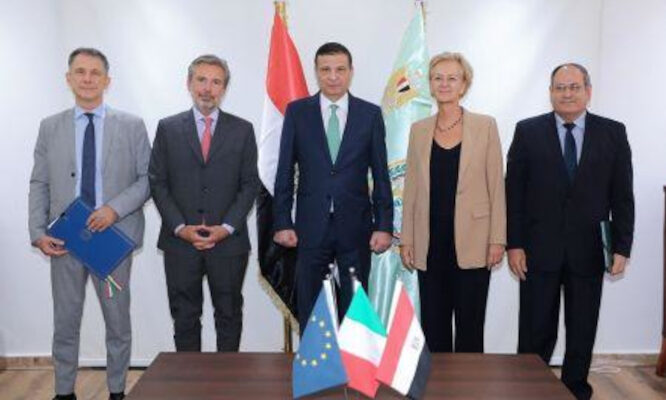
• Agreement will supply modern machinery and certified seed units
• ARC targets water-efficient, high-yield wheat varieties and better practices
• Wheat area is shrinking while imports remain high at nearly 12 million tons
Egypt’s Agricultural Research Center (ARC) signed a deal on July 16 with the Italian Agency for Development Cooperation (AICS) as part of efforts to improve national wheat yields. The move aligns with a wider strategy to modernize Egypt’s grain sector and strengthen food security.
According to the Ministry of Agriculture, the new partnership will support the wheat industry through the supply of modern farming equipment, the upgrade of varietal selection labs, and the creation of certified seed production units.
The project also includes farmer training, promotion of mechanization, and reduction of post-harvest losses using advanced tracking and traceability systems.
“This partnership is a key pillar of Egypt’s strategy for sustainable agriculture and food security,” the ministry said. The government aims to raise productivity in the wheat sector, complementing ARC’s ongoing work.
In its latest report on Egypt’s wheat market, the U.S. Department of Agriculture (USDA) noted that ARC has been accelerating efforts to develop high-yield, early-maturing wheat varieties that use less water, scale up the supply of certified seeds, and promote good agricultural practices through demonstration fields across the country. These efforts are critical because expanding wheat cultivation area faces serious structural barriers.
Wheat expansion is constrained by population growth (which would require doubling the cultivated area), limited water resources, fragmented farmland, urbanization, competition from other winter crops, and rising production costs, the USDA reported.
According to data from the FAO, Egypt’s wheat cultivation area has been declining at an annual rate of 0.49% between 2013 and 2023s, from 1.41 million hectares down to 1.35 million hectares. Meanwhile, wheat output rose by just 0.97% per year on average, reaching 9.7 million tons in 2023, indicating a stagnation in production volumes.
To meet domestic demand, Egypt imported an average of 11.8 million tons of wheat between 2021 and 2023, while consumption hovered near 21 million tons, according to FAO estimates.
The new cooperation with AICS is part of the KAFI program, launched in 2024 and funded by the European Union with $40 million to improve grain production in Egypt.











Comments